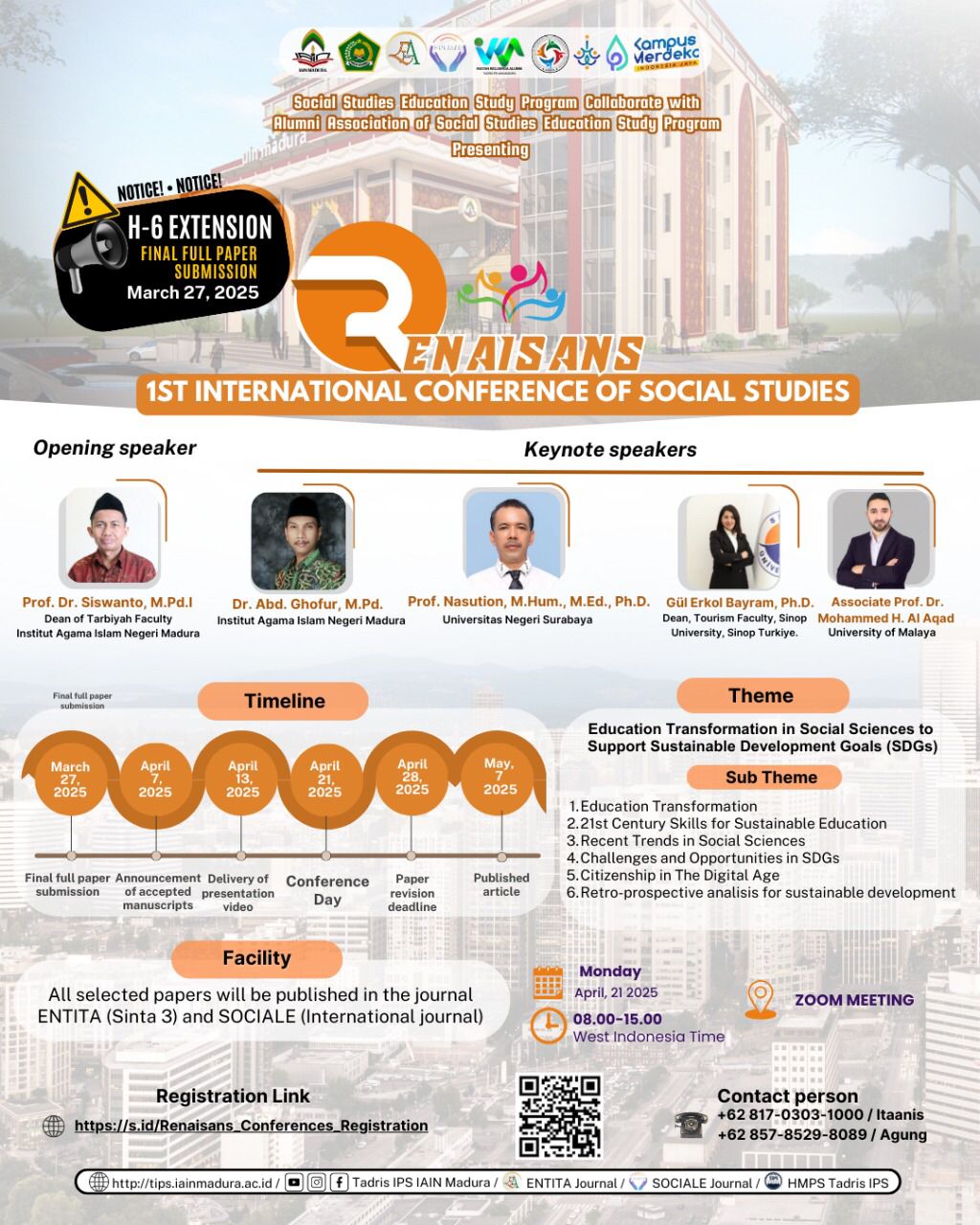Pengaruh Penerapan Model Kooperatif TGT Terhadap Hasil Belajar Siswa Mata Pelajaran IPS
 Abstract views: 8
,
Abstract views: 8
,
 PDF (Bahasa Indonesia) downloads: 8
PDF (Bahasa Indonesia) downloads: 8
Abstract
The learning model is an important factor influencing student learning outcomes. The low achievement of students in social studies at SMPN 4 Pamekasan is still a problem, mainly due to the use of less innovative models such as the lecture method, which limits active participation. This study aims to examine three key aspects. First, to analyze the effect of the TGT learning model on the learning outcomes of eighth-grade students at SMPN 4 Pamekasan and to what extent the TGT model can improve student performance. Second, to compare the average pretest and posttest scores of students using the TGT model. Third, to compare the same scores for students taught using conventional methods. This research uses a quantitative approach with a quasi-experimental method and a Pretest-Posttest Nonequivalent Control Group design. Pretests and posttests were conducted in both groups. The results showed a significance value of 0.014 with a t-count of 6.619, indicating a significant effect of the TGT model. N-Gain analysis showed a 90% increase in the experimental group and 26% in the control group. The experimental class improved from 32.19 to 92.76, while the control class increased from 43.64 to 60.00, proving the greater effectiveness of the TGT model.
Downloads
References
Abustang, W. F. P. B. (2020). Pengaruh Minat Belajar Terhadap Hasil Belajar Ips. Jurnal Kajian Pendidikan Dasar, 7(1), 28–35.
Asrulla, Risnita, Jailani, M. S., & Jeka, F. (2023). Populasi dan Sampling (Kuantitatif), Serta Pemilihan Informan Kunci (Kualitatif) dalam Pendekatan Praktis. Jurnal Pendidikan Tambusai, 7(3), 26320–26332.
Berlianti, D. F., Abid, A. Al, & Ruby, A. C. (2024). Metode Penelitian Kuantitatif Pendekatan Ilmiah untuk Analisis Data. Jurnal Review Pendidikan Dan Pengajaran, 7(3), 1861–1864.
Damayanti, S., & Apriyanto, M. T. (2017). PENGARUH MODEL PEMBELAJARAN KOOPERATIF TIPE TGT (TEAMS GAMES TOURNAMENT) TERHADAP HASIL BELAJAR MATEMATIKA. Seminar Nasional: Jambore Konseling 3, 02(02), 235–244. https://doi.org/10.1007/XXXXXX-XX-0000-00
Effendy, I. (2016). Pengaruh Pemberian Pre-Test dan Post-Test Terhadap Hasil Belajar Mata Diklat HDW.DEV.100.2.a pada Siswa SMK Negeri 2 Lubuk Basung. Jurnal Ilmiah Pendidikan, 1(2), 81–88.
Gillies, R. . (2021). Cooperative Learning: Review of Research and Practice. Educational Psychology Review, 1, 33.
Jones, A., & Okumoto, K. (2022). Inclusive Education and Cooperative Learning: Best Practices for Engaging Diverse Learners. Journal of Inclusive Education, 4, 26.
Nurdyansyah, & Fahyuni, E. F. (2016). Inovasi Model. In Nizmania Learning Center.
Purwanto, N. (2017). Psikologi Pendidikan. PT Remaja Rosda Karya.
Putri, A. A. (2022). Pengaruh Model Teams Games Tournament Berbantuan Media Question Card Terhadap Pemahamn Konsep Bangun Ruang. Borobudur Educational Review, 2(2), 50–57. https://doi.org/10.31603/bedr.6793
Suardipa, I. P. (2020). Sociocultural-Revolution Ala Vygotsky Dalam Konteks Pembelajaran. Jurnal Widya Kumara Jurnal Pendidikan Anak Usia Dini, 1(2), 48–58.
Sugiyono. (2017). Metode Penelitian Kuantitatif, Kualitatif Dan R&D (p. 329).
Sumiati, M., Dewi, A. S., & Mubarok, M. K. (2023). Pengembangan Media Pembelajaran KARTIKRU untuk Meningkatkan Hasil Belajar Siswa Kelas III Sekolah Dasar. JIIP - Jurnal Ilmiah Ilmu Pendidikan, 6(7), 4692–4698. https://doi.org/10.54371/jiip.v6i7.2334
Susanto, A. (2014). Pengembangan Pembelajaran IPS di Sekolah Dasar. Prenadamedia Group.
Wibowo, F. (2022). Ringkasan Teori-Teori Dasar Pembelajaran. Guepedia.
Widhiastuti, R., & Fachrurrozie. (2014). Teams Games Tournament (Tgt) Sebagai Metode Untuk Meningkatkan Keaktifan Dan Kemampuan Belajar. Pendidikan Ekonomi Dinamika Pendidikan, IX(1), 48–56.
Copyright (c) 2025 Entita: Jurnal Pendidikan Ilmu Pengetahuan Sosial dan Ilmu-Ilmu Sosial

This work is licensed under a Creative Commons Attribution-NonCommercial 4.0 International License.
ENTITA: Jurnal Pendidikan Ilmu Pengetahuan Sosial dan Ilmu-Ilmu Sosial operates an Open Access policy under a Creative Commons Non-Commercial 4.0 International license. Authors who publish with this journal agree to the following terms:
- The copyright of the received article once accepted for publication shall be assigned to the journal as the publisher with licensed under a

- Journal is able to enter into separate, additional contractual arrangements for the non-exclusive distribution of the journal's published version of the work (e.g., post it to an institutional repository or publish it in a book), with an acknowledgement of its initial publication in this journal.
- Journal is permitted and encouraged to post their work online (e.g., in institutional repositories or on their website) prior to and during the submission process, as it can lead to productive exchanges, as well as earlier and greater citation of published work (see The Effect of Open Access).
- Here is Copyright Transfer Form that author can download and send to OJS during submission.

















